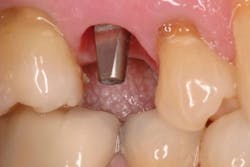By Robert Margeas, DDS
For more on this topic, go to www.dentaleconomics.com and search using the following key words: changing patient, satisfaction, dental implant, collaboration, Dr. Robert Margeas.
Dental implants have been shown in some cases to have a greater than 98% success rate, yet only about 15% of candidates receive implant-supported treatment. One of the reasons for this discrepancy: many patients who are eligible for implants are never presented with this treatment option by their general dentists.
This article deals with common indications for dental implants and explains when they are an appropriate treatment option, as well as situations in which dentists should consider consulting specialists before making a treatment recommendation. My goal is to provide advice to general dentists regarding when dental implants truly are the best option for a patient, even if they may be outside the dentist's comfort zone.
The first step: Keeping an open mind for optimal results and patient satisfaction
As dental technology evolves, general dentists have more treatment options to consider than ever. Much of the decision-making process involved in developing a treatment plan depends on the dentist's experience and comfort level with various treatment options, as well as on the patient's insurance reimbursement. But what happens when the best treatment option is one with which the dentist is not comfortable?
Crown and bridgework and dentures are not always the ideal solution, and their placement can result in many problems. Dentures may slip and lead to bone loss where teeth are missing, while crown and bridge treatments often sacrifice two healthy teeth to restore a single tooth.
Many dentists today opt for a crown and bridge to complete large restorations since it is a predictable treatment option with good results; however, dental implants – particularly those supported by a wealth of clinical data – provide the best long-term treatment option for appropriate candidates.
Most likely to succeed: Which patients are the best candidates for dental implants?
When considering implants as a more routine treatment option, the question arises as to who should be offered the implants? The ideal candidate for a dental implant has changed through the years. Additionally, implants can be used in more cases today.
There are several key determinants for dental implant candidates. One of the deciding factors is the amount and quality of bone available to support the implant. In general, it is recommended that patients with good quality bone and tissue, a healthy mouth, and who maintain good oral hygiene are ideal candidates.
The results of a single-unit implant are predictable and deliver an esthetically superior result; however, there are other instances in which placing an implant might be an appropriate treatment option.
While crown and bridgework and dental implants have advantages and disadvantages that general dentists need to consider, there are several additional factors that dictate a patient's treatment path.
If presented with several missing teeth, general dentists often move forward with placing a bridge; however, dental implants present a great treatment option in this instance because they provide support for replacement teeth and dentures, and can help prevent slipping and additional bone loss. The replacement teeth can then be attached to the implants, which serve as an anchor or support.
Using dental implants to stabilize dentures is currently an underused procedure, but it provides general dentists with a cost-effective treatment solution. As part of the lower implant-retained over-denture using the two LOCATOR attachments procedure, the patient's dentures can be retrofitted and new dentures will not be required.
Implants should also be considered for use with other restorative procedures. In addition, general dentists find that younger patients with congenitally missing teeth are reluctant to compromise healthy teeth for a bridge.
In these cases, implants present the best treatment option although older patients tend to opt for a bridge, if they have already had dental work completed.
Collaboration for successful results
Dentists who are new to dental implants should collaborate with their preferred specialists to determine if implants should be considered in more complex cases. There may be cases when the dentist would not consider an implant, but by working with a specialist, the dentist can recommend treatment that will be less costly and time-intensive for the patient and the dental practice.
For example, patients often present with missing lateral incisors but may not have adequate facial bone for implant placement. This necessitates use of a CT scan, which can help identify if there is adequate bone. If there is not, a surgeon can do a bone graft to bulk up the ridge for a good esthetic outcome.
The surgeon may also have to do a connective tissue graft if the biotype of the periodontium is thin. These are predictable procedures today, and offer excellent results.
In general, collaboration between the dentist and specialist throughout the implant process is critical. Many dentists restoring an implant for the first time experience miscommunication with specialists and labs that can result in problems with the restoration. This leads to an unsatisfied patient and a dentist who will not want to continue restoring implants based on this initial experience.
A careful treatment plan needs to be followed and the general dentist should take responsibility to ensure a smooth process. One of the most important things for members of the team is to stay in close contact with each other to make sure everyone clearly understands what needs to be done. Dentists leading the process should use surgical guides to help accelerate the process and ensure successful restorations.
Setting expectations – implants are still serious business
While dental implants in many cases present the best opportunity for long-term tooth restoration, the dentist and patient must understand the process. Placing a dental implant is a surgical procedure that should be referred to a trained specialist if the general dentist has not had adequate training in this procedure.
Dental implants can take time to restore, depending on the amount of work needed. A specialist may have the best surgical skills, but if the anatomy of the patient is not in line with the above-mentioned requirements, a great esthetic outcome will be much harder to achieve. In addition, once the dental implant process has begun, the patient has to take into account a certain healing period, which can take up to six months.
Conclusion
As recently as five years ago, patients and dentists alike had to invest a great deal of time to complete a dental implant restoration. Today, dentists can extract and place a temporary tooth in one office visit. This allows patients to leave looking and feeling great. But this is contingent on the dentist identifying the ideal implant candidate, and working effectively with specialists to ensure that the process is seamless and that the result is rewarding for the professionals, as well as the patient.
Dr. Robert Margeas is board-certified by the American Board of Operative Dentistry, and is a Fellow of the Academy of General Dentistry. Dr. Margeas maintains a private practice with a focus on comprehensive esthetic restorative dentistry in Des Moines, Iowa, and has been restoring implants since 1988. Dr. Margeas can be reached at [email protected].








